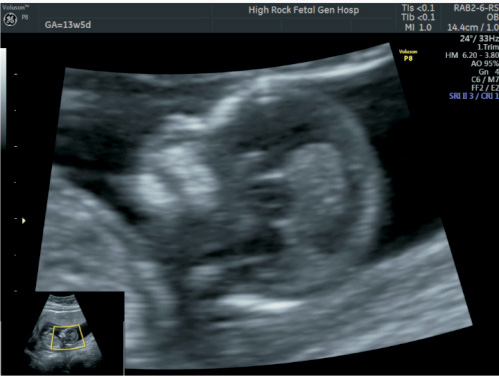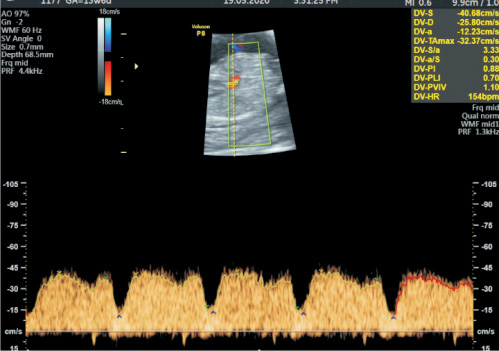
Nuchal Translucency

Nasal Bone

Ductus Venosus
NUCHAL TRANSLUCENCY (NT) SCAN
This is the use of the ultrasound scan to measure the fluid at the back of the neck of the baby. All babies give the fluid at the back of the neck, which is best measured at between the 11-13+6 weeks of pregnancy. After this period, the fluid resolves in normal pregnancy. In fetuses affected by congenital abnormalities, there is an abnormal accumulation is chromosomal abnormalities such as Down syndrome, genetic syndromes as well as structural abnormalities such as cardiac defects. The measurement of the fluid has been shown to provide a better and reliable assessment of the risk of chromosomal abnormalities such as Down syndrome in the fetus, as well as some genetic syndromes and structural abnormalities.
The NT is essentially a screening test, with a detection rate for Down syndrome of about 80% (Maternal age alone picks up about 30% of babies with Down syndrome).
As a screening test, it will not tell you definitely whether or not your baby has Down’s be used to make an informed decision about whether to have an invasive test such as chorionic villous sampling or amniocentesis.
In every case of increased nuchal scan, a detailed heart scan is recommended. The nuchal translucency scan is also referred to as early anomaly scan because of the fact that over 80% of the major fetal structures can be identified and assessed at this period. Otherwise called the anomaly scan. It is a specialized screening and diagnostic scan (advanced scan) performed between the 18th and 23rd weeks of pregnancy, to detect structural congenital abnormalities in the fetus. Detailed attention is given to the major organs to include the face, brain, spinal cord, heart, bowels, kidneys and limbs. In skilled hands, it is able to detect virtually all forms of anomalies.
Irrespective of the NT scan, it is recommended that every pregnant woman also do the anomaly scan. More importantly, in women that missed the early trimester scan, the anomaly scan provides an opportunity to identify soft tissue markers for chromosomal abnormalities and genetic syndromes.
Counseling is provided at the end of the scan session, on the outcome of the scan and the prognosis for the fetus. We often times conduct cervical length assignment at the period of anomaly scan in pregnancies at a high risk of preterm delivery. This include twin pregnancies, previous history of preterm delivers etc.

